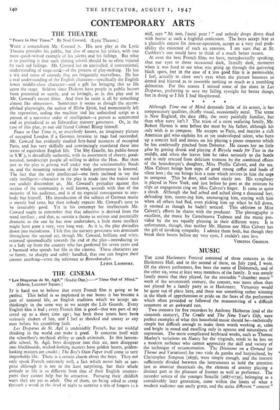THE CINEMA
"Les Disparus de St. Agil." (Studio One.)—" Time Out of Mind." (Odeon, Leicester Square.)
IT is hard not to believe that every French film is going to be perfect. This belief is so implanted in our bones it has become a part of national life, an English tradition which we accept un- thinkingly in the same way as we accept the Life Guards. Every English film is bad ; every French film is good—that was part of my creed up to a short time ago ' - but both these tenets have been seriously shaken of late, and I feel as shocked and uneasy as any
man before his crumbling faith. ,
Les Disparus de St. Agil is undeniably French, but no wishful thinking in the world can make it good. It concerns itself with the schoolboy's mythical ability to catch criminals. In this lament- able school, St. Agil, boys disappear into thin air, men disappear into blackboards, wicked-looking masters have golden hearts, golden- looking masters are crooks ; The Boy's Own Paper itself come to very improbable life. There is a certain charm about the boys. They not only speak French extremely well, a fact which never fails to sur- prise although it is not in the least surprising, but their whole attitude to life is so different from that of their English counter- parts they cannot help but be attractive. Pursuing their childish ways they are yet so adult. One of them, on being asked to creep through a wood in the dead of night to surprise a trio of forgers in a mill, says " Ah non, j'aurai peur " and nobody drops down dead with horror: at such a frightful confession. The boys accept fear as a plausible excuse for non-co-operation, accept as a very real prob- ability the existence of such an emotion. I am sure that at St. Cuthbert's one would have to think of a much better reason.
At even the best French films we have, metapahoric2Ily speaking, shut our eyes to those occasional dark, literally dark, moments when it was hard to see what was going on through the quivering black spots, but in the case of a less good film it is permissible, I feel, actually to close one's eyes when the picture becomes so dotted and blurred as to resemble nothing so much as a trembling dalmatian. For this reason I missed some of the shots in Les Disparus, preferring to save my failing eyesight for better things, but in doing so I felt I had blasphemed.
* * * *
Although Time out of Mind demands little of its actors, it has compensatory qualities, chiefly visual, occasionally aural. The scene is New England, the date 1880, the story painfully familiar, but then what story isn't ? The scion of a stem seafaring family, Mr. Robert Hutton is sent before the mast by his father, although his only wish is to compose. He escapes to Paris, and marries a rich American girl who exploits his as yet undeveloped talent, who buys up a concert hall and insists on his playing a piano concerto which he has confessedly pinched from Debussy. He causes her no little gene by getting drunk and playing A Bicycle made for Two in the middle, and when she leaves him he takes seriously to the bottle and is only rescued from delirium tremens by the combined efforts of the housekeeper's daughter, Miss Phyllis Calvert, and the sea. Miss Calvert brings him cups of good strong coffee and loads of silent love ; the sea brings him a tune which revives in him the urge to compose. This he does, and rather nicely too. His symphony is played in New York, and just before he goes to the rostrum he slips an engagement ring on Miss Calvert's finger. It came as quite a shock. Although she had ached and ached along a thousand feet, defending him, nanny-ing him, encouraging him, staying with him when all others had fled, even picking him up when he fell down, it seemed as though he hadn't noticed. This oblivion to Miss Calvert's efforts he shares with the producer. The photography is excellent, the music by Castelnuova Tedesco and the music pro- vided by the sea equally pleasing in their different ways. It is unfortunate, though, that neither Mr. Hutton nor Miss Calvert has the gift of invoking sympathy. I admire them both, but though they break their hearts before my very eyes, I couldn't care less.
VIRGINIA GRAHAM.


































 Previous page
Previous page